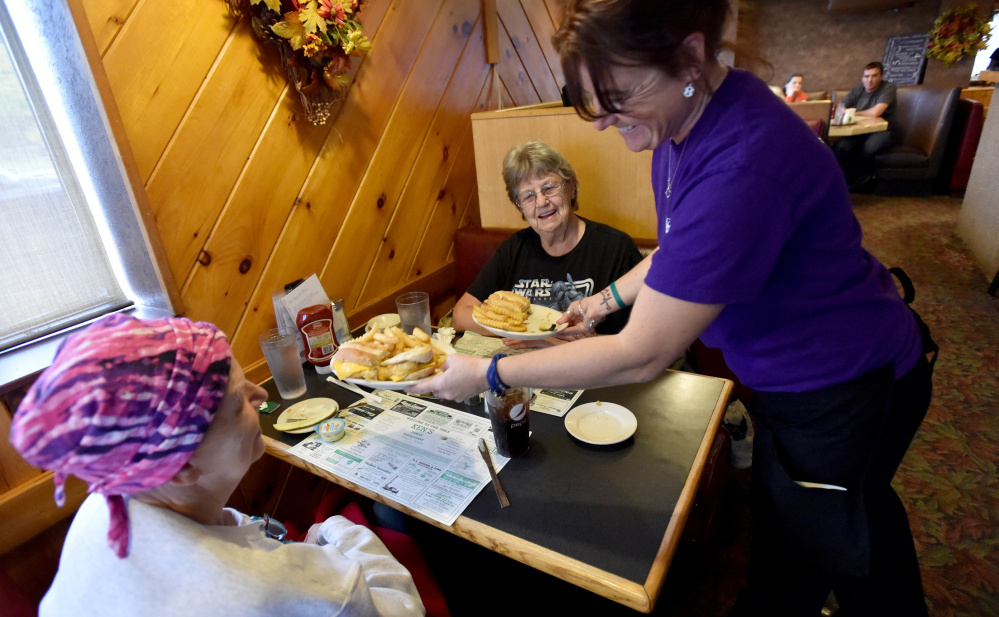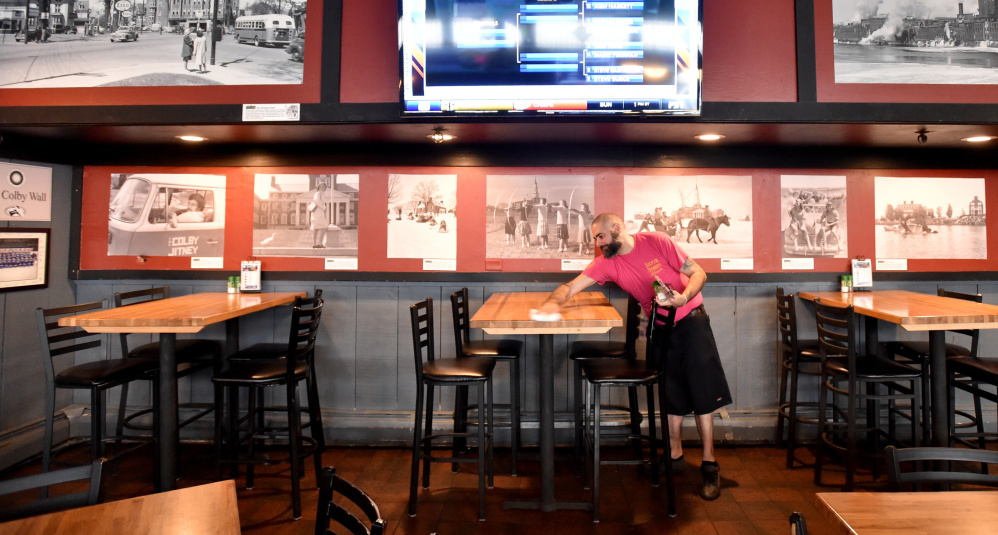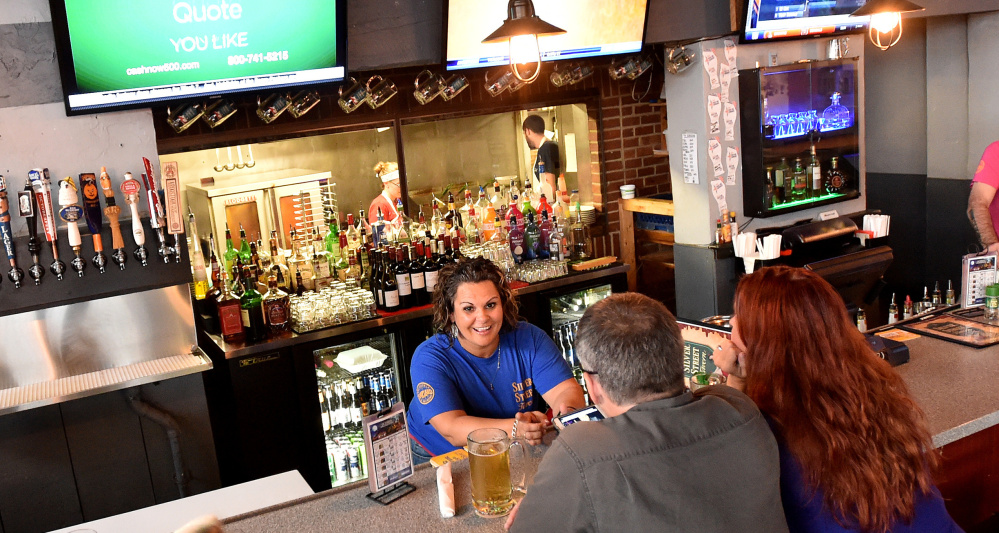SKOWHEGAN — For the last 10 years, Tammie Webber has counted on the tips she makes as a waitress at Ken’s Family Restaurant to make ends meet.
Webber, 41, a single mother from Clinton, said she doesn’t think she would make as much money if her income came from a higher hourly wage, a move that she said could jeopardize whether she continues to receive tips.
“I count on my tips to make a living,” Webber said. “I don’t think people would tip if they knew I was getting the minimum wage.”
Many restaurant workers across central Maine who make their living off tips say they agree with Webber and are growing concerned about their future if voters on Nov. 8 approve an increase that would raise the minimum wage gradually to $12. The referendum proposal, which goes before voters as Question 4, also would bring the minimum wage for tipped workers, currently set at half the regular minimum wage, up to $12 an hour by 2024.
Proponents of the increase, including the Maine People’s Alliance and AFL-CIO, which spearheaded efforts to get the initiative on the ballot, say workers have nothing to worry about. They say the change would help workers and put more money in the economy; but the Maine Restaurant Association has fiercely opposed the referendum, saying it “goes too far too fast” and would hurt business.
A local economist also said restaurant workers probably don’t need to worry about losing their tips – one of the most widespread concerns – and while he said minimum wage increases are generally good for the economy, he also expressed concerns about whether the proposal does go too far too fast.
“Minimum-wage increases are good for workers if they keep their jobs,” said Philip Trostel, a professor of economics at the University of Maine. “If they make more money, great; but the issue is does it lead to less employment?”
The average wage for tipped servers in Maine is just $9.05 an hour, according to the U.S. Bureau of Labor Statistics. Mike Tipping, communications director for the Maine People’s Alliance, said that’s not enough and that tipped employees are some of the lowest paid workers, although the Maine Restaurant Association said the average wage for restaurant workers in the state is more around $16 per hour to $35 per hour when tips are included.
TIP CONCERN
Across central Maine, several servers said they already make more than the minimum wage from tips, and their biggest concern is that they will make less. Trostel, the economist, said that’s unlikely, because tipping is already such a big part of American culture.
“I don’t think Mainers are going to think that much about minimum wage,” he said. “I don’t think that will be something people think about when they leave tips, particularly in a state that has so many out-of-staters.”
But Cheryl Pellerin, 57, a waitress and bartender at The Last Unicorn in Waterville, is not convinced.
“I don’t want the government messing with something that’s working,” she said. “If it ain’t broke, don’t fix it.”
Some of her customers, such as Kenneth Austin, of Belgrade, said he doesn’t plan to stop tipping, but he probably wouldn’t tip as much if he knew his server was getting $12 an hour.
“At that amount, I think the tip percentage would drop, unless restaurants decide to outlaw tipping entirely,” he said. “I can still see some additional tip being left, an extra something based on the quality of service.”
At the Good and Plenty Diner in Anson, a server who did not want to give her name because of a family situation said that as a part-time worker she makes $60 on a bad day and $100 on a good day for eight hours of work. That means her employer pays her the current minimum wage of $7.50 on a bad day when she doesn’t bring in many tips, and on a good day she makes just above the proposed minimum wage of $12 an hour.
“I think I would make less money,” the woman said. “Customers wouldn’t know if they’re supposed to tip or not, so it would be confusing.”
Tipping said that wouldn’t be the case, since most customers don’t think twice about the tips they leave in other states that have raised wages for tipped workers; while Steve Hewins, president and CEO of the Maine Restaurant Association, said Maine would be the only state east of the Mississippi to equalize the minimum wage for tipped workers, a change that could affect tipping.
RESTAURANT CHANGES
Instituting a no-tipping policy is something that at least a few restaurants in Maine already are considering or have put in place in anticipation of the changes that could come if Question 4 passes.
Cara Stadler, an award-winning restaurateur and chef in Brunswick and Portland, announced last week that her restaurants will eliminate tipping Dec. 1 and instead will charge customers an automatic 18 percent service charge as they begin paying servers at an hourly rate of $15 to $16.
Trostel said he would expect those kinds of policies to happen in some instances and didn’t think they would be widespread. For most restaurants, he said, the increased costs associated with offering a higher wage would be minimal, although a dramatic increase such as $12, though gradual, could lead to the elimination of some jobs.
Andrea Shorty, a waitress at the Silver Street Tavern in Waterville, said that without tips, she thinks the quality of service would decline in restaurants.
“If a server makes $12 or $15 an hour, there’s no incentive to give the customer service you would when you’re making $3.75 an hour and working for your tips,” said Shorty, 39. “I think servers would be more lax.”
Shorty supports a minimum-wage increase for other workers who aren’t making tips and even supports a small raise in base pay for tipped workers, but said the referendum proposal aims to do too much.
Trostel also said the plan is ambitious and expressed reservations about a minimum-wage increase of more than 25 percent, even though recent increases passed in places such as New York and Seattle have followed the same pattern.
With such a large increase proposed – a 60 percent increase of the minimum wage and an increase of more than 200 percent for tipped workers – Trostel said it is possible some restaurants could lay off workers or even go out of business.
“Going from $7.50 to $9 an hour, that’s the type of increase we’ve seen before and we haven’t seen very big impacts; but going all the way to $12, that’s a big increase in the minimum wage,” Trostel said. “I don’t know if we can be quite as confident the impacts will be pretty small.”
At the Early Bird Diner in Oakland, Jessica Furbush, whose family owns the restaurant, said she thinks the impact of a higher minimum wage on her business would be hard. While it is unlikely they would go out of business, Furbush said they probably would have to raise prices – potentially alienating a large portion of customers who are older and on fixed incomes – and it’s possible they would eliminate wait staff in favor of an order-at-the-counter set-up.
“We would have to increase our prices so much we would probably change the set-up to that customers just order at a counter,” said Furbush, 35. “A lot of our customers are older people who come here for the reasonable prices, but I just don’t think we could keep those prices if we had to pay more.”
As it is, the diner, open 6 a.m. to 2 p.m. serves a primarily older population for breakfast and lunch only. It doesn’t sell alcohol, which contributes to higher checks in some restaurants, but servers said they have a lot of customers and typically bring home more than they would earn from a minimum-wage paycheck because of the large number of customers and quick turnover on tables.
Misty Bernard, who has worked for 16 years at the Oakland diner, said if the referendum passes, she will look for another job.
“Waitressing is pretty hard work. Why would I bust my butt running around for $12 or $13 per hour when I can make the same sitting in an office?” she said.
At Ken’s in Skowhegan, a stack of fliers from the Maine Restaurant Association urging voters to not support the referendum awaits customers at the door. Tammie Webber said she has some regular customers that she could count on to keep leaving tips, but others she thinks would cut back, resulting in less money she would be taking home. Trostel said it’s unlikely that would happen, but there’s no guarantee.
“I’d never stop tipping, but I know a lot of people will,” said Janice Beane, 50, herself a former waitress who was having lunch at Ken’s. “If people know the wait staff is making minimum wage, they would stop tipping.”
Her mother, Orlene Beane, 85, however, said she sees a benefit to raising the wage for tipped workers.
“It would be a way to ensure a week’s pay,” she said. “The tips could be extra. A lot of time they don’t make a week’s pay, especially in the wintertime.”
“I don’t know,” her daughter said. “Anybody that makes tips likes their tips.”
Send questions/comments to the editors.





